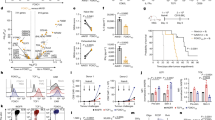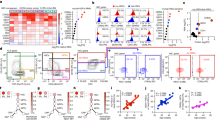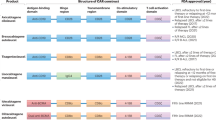Abstract
The pressing need for a better experimental system for AIDS research has brought into sharp focus the shortcomings of available animal models and the practical and ethical limitations of studies of immune responses and viral pathogenesis in humans1,2. Current studies of the human immune responses are limited to relatively restrictive in vivo experiments and several in vitro systems that, although useful, allow only short-term studies and support responses to a few antigens2. Neither model is particularly amenable to studies of the pathogenesis of diseases of the immune system. We report here that injection of human peripheral blood leukocytes (PBL) can result in the stable long-term reconstitution of a functional human immune system in mice with severe combined immunodeficiency (SCID)4. Human PBL transplanted to SCID mice increase in number and survive for at least six months; reconstituted mice show spontaneous secretion of human immunoglobulin and a specific human antibody response is induced following immunization with tetanus toxoid. All of the major cell populations present in PBL are found in the lymphoid tissue and blood of SCID recipients, although the relative proportions of B cells, T-cell subsets and monocytes/macrophages in long-term recipients differ from those found in normal PBL and, in mice transplanted with 50 x 106 or more PBL from Epstein-Barr virus (EBV)-seropositive donors, EBV-positive B-cell lymphomas often develop. Our results suggest that xenogeneic transplantation of human lymphoid cells into SCID mice may provide a useful model for the study of normal human immune function, the response of the immune system to pathogenic agents and early events in lym-phomagenesis.
This is a preview of subscription content, access via your institution
Access options
Subscribe to this journal
Receive 51 print issues and online access
$199.00 per year
only $3.90 per issue
Buy this article
- Purchase on Springer Link
- Instant access to full article PDF
Prices may be subject to local taxes which are calculated during checkout
Similar content being viewed by others
References
Newmark, P. Nature 333, 699 (1988).
Zagury, D. et al. Nature 332, 728–731 (1988).
Immun. Rev. 45, 1–275 (1979).
Bosma, G. C., Custer, R. P. & Bosma, M. J. Nature 301, 527–530 (1983).
Ware, C., Donato, N. & Dorshkind, K. J. immunol. Meth. 85, 353–361 (1985).
Reddy, S. et al. Cancer Res. 47, 2456–2460 (1987).
Aman, P., Ethlin-Henriksson, B. & Klein, G. J. exp. Med. 159, 208–220 (1984).
Farzad, Z., James, K. & McClelland, D. B. L. J. immun. Meth. 87, 119–125 (1986).
Weiss, L. M. et al. Blood 67, 474–478 (1986).
Shearer, W. T. et al. New Engl. J. Med. 312, 1151–1159 (1985).
Tosato, G. et al. J. clin. Invest. 73, 1789–1795 (1984).
Author information
Authors and Affiliations
Rights and permissions
About this article
Cite this article
Mosier, D., Gulizia, R., Baird, S. et al. Transfer of a functional human immune system to mice with severe combined immunodeficiency. Nature 335, 256–259 (1988). https://doi.org/10.1038/335256a0
Received:
Accepted:
Issue Date:
DOI: https://doi.org/10.1038/335256a0
This article is cited by
-
B cell development and antibody responses in human immune system mice: current status and future perspective
Science China Life Sciences (2024)
-
Hybrid brains: the ethics of transplanting human neurons into animals
Nature (2022)
-
In Vivo Modeling of Human Breast Cancer Using Cell Line and Patient-Derived Xenografts
Journal of Mammary Gland Biology and Neoplasia (2022)
-
Improving the Efficacy of Regulatory T Cell Therapy
Clinical Reviews in Allergy & Immunology (2022)
-
Humanized Mice for Infectious and Neurodegenerative disorders
Retrovirology (2021)
Comments
By submitting a comment you agree to abide by our Terms and Community Guidelines. If you find something abusive or that does not comply with our terms or guidelines please flag it as inappropriate.



